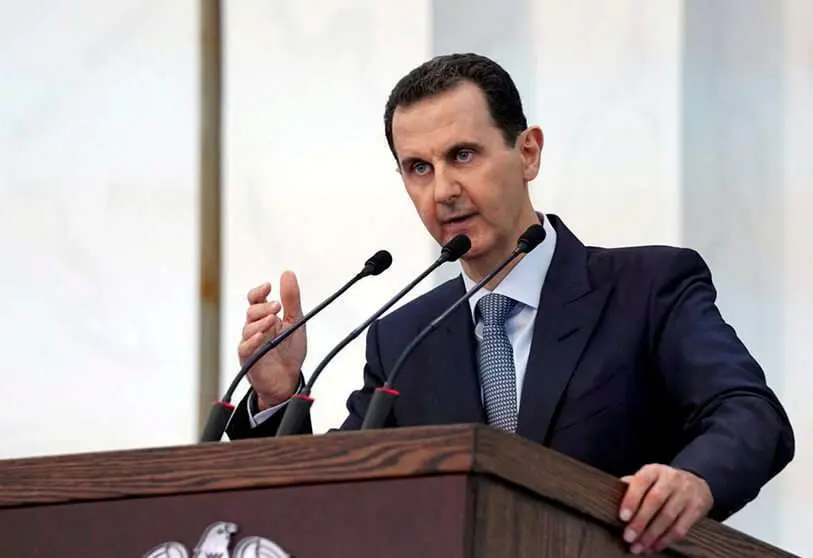Syria's opposition, ten years on, still unable to stand up to Bashar al-Assad

Syria is now entering its tenth year of conflict, a war that is leaving heartbreaking figures: more than 387,000 dead, according to the Syrian Observatory for Human Rights (OSDH), 5.6 million refugees abroad and around 6.7 million internally displaced persons, according to the United Nations (UN). In total 38 chemical weapons attacks, according to the UN, 32 of which are attributed to the regime. One of these attacks caused some 1,400 deaths in 2013, crossing the famous "red line" of former US President Barack Obama, but which ultimately did not retaliate.
The conflict, far from ending, seems to be dragging on for ever, with most international powers having already accepted Bashar al-Assad's determination to stay in power, whatever the cost. And the Syrian opposition, poorly organised and with little political clout, has been able to do little in recent years to present itself as a credible option to the regime.

The Arab uprisings of 2011, popularly known as the Arab Spring, also shook the Syrian country. The first demonstrations in Tunisia spread to other countries that finally woke up from their lethargy and decided to rise up against the tyranny of their governments. Syria, for its part, was one of the countries where this movement arrived later. The main reason can be deduced from the existence of a very divided opposition due to the mosaic of ethnicities and religions that coexist in the country, unable to organise themselves into a common front.
Since the start of the Syrian civil war, the opposition has not been able to show a united front to fight the eternal President Bashar al-Assad. As clashes between regime opponents and government forces became more frequent, opposition groups began to organise themselves. All those groups calling for the resignation of Bashar al-Assad and the fall of the Baathist regime met in June 2011 in Istanbul, Turkey, and formed the Syrian National Council (SNC) in October with the aim of uniting or at least coordinating the forces resisting inside the country with Syrian opposition organisations abroad.

A wide range of dissidents were present: from the exiled Muslim Brotherhood in Syria, to intellectuals, journalists and opposition figures demanding democratic reforms, to tribes and young activists.
From the outset, it is clear that the opposition is quite heterogeneous in character, making it difficult to establish a unified leadership, which becomes a problem when it comes to presenting an alternative to the regime to the international community.
On the one hand, there is the Syrian National Council (SNC), which combines members of the Damascus Declaration, members of the Muslim Brotherhood party, the Local Coordination Committees and several Kurdish parties, and in early December decided to ally itself in a political front with the Free Syrian Army.

On the other hand, the National Committee for Democratic Change (NCDC), which brings together veteran regime dissidents and young activists, is left-leaning and rejects the idea of foreign intervention in the country. These two major opposition groups decided to join forces against al-Assad in a pact signed in December of the same year in Cairo, with the aim of becoming a solid alternative in the event of a transition in the country, and the pact also includes the rejection of any foreign military intervention and the fall of the regime in order for such a transition to take place.
By the end of 2011, Syria was immersed in a bloody civil war pitting the government armed forces supported by the Alawite religious minority against the Sunni majority that supported the rebel groups.
The emergence of djihadism in 2014 triggered a paradigm shift in the international conflict that led to a change in the interests of the different powers involved in the conflict. The priority in Syria is no longer to overthrow dictator Bashar al-Assad but to halt the jihadist advance, especially that of Daesh.

But the opposition in exile is not giving up. Under the patronage of Saudi Arabia, the High Negotiations Committee (HCN) was created at the end of 2015 and other coalitions were formed: the 'Cairo Group' and the 'Moscow Group'. In 2017, these three groups joined forces to form a single delegation for negotiations with the regime. The situation on the ground, however, is increasingly contrary for the rebel groups, which are losing control of the territory and the support of international forces, which are taking over the military supremacy of the regime supported by Russia and Iran.
As a result of the military defeats, the Geneva negotiations were overshadowed by the so-called Astana process, established by Moscow and Tehran. At present, negotiations between the opposition and the regime under UN auspices are reduced to the work of a constitutional committee, which seems doomed to an impasse.

Syria is in an even worse situation than before the so-called Arab Spring, with Bashar al-Assad emerging stronger from this conflict, with the unconditional support of Russia and Iran. We also find an opposition unable to unify its ranks and present a credible alternative to the regime. All of this has a direct impact on the civilian population, which is suffering the ravages of a war that is dragging on, a pressing economic crisis that is causing the continuous displacement of Syrian citizens to other territories.








